Wheels on Meals (1984)
Directed by: Sammo Hung
Written by: Edward Tang, Gwing-Gai Lee
Starring: Jackie Chan, Lola Forner, Sammo Hung, Yuen Biao
AKA KUAI CAN CHE, SPARTAN X
Hong Kong
AVAILABLE ON BLU-RAY: 18TH MARCH 2019
RUNNING TIME: 104 mins
REVIEWED BY: Dr Lenera, Official HCF Critic
Thomas and David are cousins who run a fast food van in Barcelona. Meanwhile, bumbling private eye Moby gets himself a lucrative private detective job meant for his boss, receiving a huge sum of money to try to find a woman called Gloria and her daughter Sylvia. Gloria is actually in an asylum with David’s father and the two are madly in love with one another. However, Sylvia likes to steal wallets off guys, though that doesn’t stop Thomas and David from both becoming enamoured of her. Then some bad guys turn up trying to capture both women….
I remember writing in my review of Project A [also released by Eureka Entertainment with its sequel] that I wasn’t sure that Jackie Chan had ever quite topped it since, despite the brilliance of much of Police Story, Drunken Master 2 et al. But I was of course referring more to films that Chan directed himself. I have a feeling that many hardcore Hong Kong movie fans will agree with me when I say that some of his very best work was done under the direction of his buddy Sammo Hung, and even that three particular films helmed by Hung are among the greatest films that he ever made, those three films being Wheels On Meals, Heart Of A Dragon and Dragons Forever. I’ve pondered for some time about doing a monthly feature for Horror Cult Films on film directors I feel have been neglected, and if I end up doing it then one of the names I’ll try to make a strong case for is Hung, to my mind an underrated filmmaker if ever there was one. But for now we have Wheels On Meals. This action comedy may not be as jam packed full of fights and stunts as some of Chan’s other films, but I think that it’s a measure of its overall quality that you could take out all the martial arts and still be left with a pretty enjoyable and involving film, and one that’s consistently funny to boot – and I readily admit that not all Hong Kong movie humour tends to work for Western audiences. Saying all that, this film also contains a fight scene which many aficionados of martial arts cinema regard as one of the best ever.
The title was supposed to be Meals on Wheels, but superstitious Golden Harvest executives demanded the title change because their two previous films with titles that began with the letter ‘M’ – Megaforce and Menage A Trois – had been big flops. Made just after Project A, this reunited Chan with Hung and Yuen Baio with who he’d performed as members of the Peking Opera troupe the Seven Little Fortunes when they were all children. Hung decided to film in Barcelona because the Hong Kong authorities were making it harder to film there and stars like Chan could barely go anywhere without being mugged. While on-location, co-stars Benny Urquidez and Keith Vitali visited the various dojos throughout Spain to test their martial arts skills against the local black belt talents. Vitali accidentally kicked Jackie Chan in the throat after numerous takes for a fight scene, and also kicked Hung in the head. Hung responded by ensuring that Vitali was knocked out by a real vase full of water for real in a later scene. As for Chan and his screen opponent – Benny ‘The Jet’ Urquidez – there was some tension. Urquidez kept hitting Chan for real who eventually told him “hit me again and you’ll never work in Hong Kong films again”. Chan then challenged Urquidez to fight him in a charity match in Hong Kong and cast and crew expected this to happen though in the end it didn’t – well, except that Urquidez did return to fight him in Dragons Forever. Wheels On Meals was another huge hit, especially in Japan where it was re-titled Spartan X and spawned two video games and a comic book series. Chan, Baio and Hung were able to dub themselves for the international version which had a new score by Keith Morrison, though this was later supplanted by a different English dub with the original music.
The film’s light approach is obvious right from the offset where we first meet Thomas and David and it looks like we’re looking at two separate rooms until one of the guys crosses into one side from the other. The two do some morning training, but while David does some fast moves with their dummy, Thomas just can’t be bothered. Thomas jumps out of their window onto the awning of the shop below but when David tries it the shopkeeper moves the awning and he lands hard on the ground – and yes, we see Biao hitting the ground hard in one take. Somebody asks them for directions to somewhere but Thomas gives him silly instructions that assume he’ll get lost. David accidentally splashes a policeman with water while washing their van, after which Thomas gives him a cloth with which to wipe his face – a cloth full of oil. Of course it’s generally simple humour but surprisingly diverse and most of it translates pretty well. Dialogue exchanges are of the nature of: Thomas: “We’ve got a flat tire”. David: “Don’t worry, I can fix it. You made such a big deal”. Thomas: “What should I have said?” David: “A flat tire. Ha ha. We’ll fix it”. Thomas: “No sane person would say that”. Crazy guy: “Ha ha! We’ve got ourselves a flat tire!” Thomas:“You’re right, no sane person would”. Maybe not hilarious but consistently amusing and there are very few moments where you’re not intended to have at least a smile on your face. I guess some of today’s more sensitive types may not like scenes where mental illness is mocked, though the script actually makes the point that these inmates of the sanitarium in the film may be mentally ill, but that certainly doesn’t mean that they’re stupid. Similarly scenes where Thomas and David try to ingratiate themselves with the delectable Sylvia may be awkward but are miles away from the horrid harassing in the Lucky Stars comedies that Hung and Chan made around the same time. And a sight gag where the portly Moby finds himself in a bar full of people larger than himself is one of the film’s comedy highlights because it’s so under-emphasised.
Chan and Biao do some sparring, Chan gets to show off his skateboarding skills, and some bikers making a nuisance of themselves around Thomas and David’s fast food van are summarily defeated, but the majority of the action is bravely confined to the second half of the film as the screenplay concentrates more on humour and its plot, gradually linking strands together so it all works pretty well as a story where you’ve become attached to the characters. Sylvia is often irritatingly introduced with soppy music and tumbling hair, but she’s given moments where she’s allowed to become a genuine person who you care for, rather than just be someone for the males to lust after or kidnap. The cousins are besotted with this pretty thief who even masquerades as a hooker to take money off men. Moby is trying to locate these two women for a man with a hell of a lot of money, but some hoodlums are also after the women and are willing to attack anyone who gets in their way. When Sylvia robs Moby [who doesn’t know who she is] after she accidentally crashes her car into his, this leads to most of the characters winding up chasing each other, but even when the thrills properly get underway there remains an emphasis on characterisation and in particular the specific strengths of our trio of heroes. When they try to get into a castle, we see Chan of course going for the complicated tree and building climb, Baio using a grapple and a rope [and finding bad guys in his way at the top whichever way he scales up!], and Hung using the front door.
There’s a terrific road chase taking us around Barcelona landmarks where the food van jumps over a motorway and sauces and restaurant equipment are put to good use. Eventual elation is of course undercut by the van driving over a stick, causing Hung to roll down a hill in another typically frightening Hong Kong movie fall. Unfortunately Chan’s deal with Mitsubishi Motors results in such unsubtle product placement as an old lady extolling the virtues of the car in this scene, as well as a huge flashing Mitsubishi sign in Barcelona’s red light district. The way that early violent encounters with bad guys are cut short may disappoint some, but the fact that we see Urquidez, who in real life was undefeated in his 27-year kickboxing and karate competition career – and who is able to perform a spin kick onscreen that’s so quick that the resulting airflow extinguishes a row of candles – briefly wiping the floor with Chan twice adds more tension to their big face off, a fight where it’s obvious that both men, not just Urquidez, are getting in some genuine blows. Chan seems to be really clobbering him towards the end! While I think I prefer their Dragons Forever rematch simply because I find it just a bit more exciting to watch, there’s no doubt that seeing these two incredible martial artists duke it out is pretty much as good as it gets for fight movie fans. Specific mannerisms given to the opponents add character and more cinematic value, while Chan’s character is only able to begin to even things when he becomes less rigid and treats the encounter more like a training session, surely an important lesson for budding martial artists. But let’s not forget Hung showing his fencing prowess and Baio rolling and leaping all over the place in their own fight scenes, and the Three Musketeers moment involving the three that follows is surely a moment that all Hong Kong movie lovers hold dear to their hearts.
Hung is actually separated from the other two for a lot of the time, but the chemistry between Chan and Biao can truly be felt in all their scenes together, while Chan certainly doesn’t dominate – the others have just as much to do throughout. Lola Forner manages to be not just a pretty face as Sylvia and familiar Hong Kong funny faces Richard Ng and John Shum have amusing cameo rolls. Hung keeps things always moving and has an eye for unusual Barcelona architecture. In fact the excellently photographed settings make this one of the most visually pleasing Hong Kong movies of the decade, and let’s not forget that eerie, almost noir-like moment where Moby finds a body in a room that’s mostly dark except for some flickering red and green light coming in through a window. Very few Hong Kong movies have a scene with such a texture to it. The music score is credited to Chris Babida and Siu-Lam Tang. The Spanish-tinged main theme is overused though gets a vocal version set to one of those familiar comical montages. Action cues are more dissonant than usual though the main fight gets a great spaghetti western-style piece. There really does seem to have been a huge effort to make Wheels On Meals an all-round quality film, and is therefore even one that those not too interested in seeing people on screen beating the hell out of each other will probably still enjoy. And maybe it’s even a bit daring – I mean watch it and wonder if both of them seem to get the girl?
Wow and double wow! This is the best looking of the Eureka Entertainment Jackie Chan Blu-rays so far. I feared that the film’s brightness and much usage of white and yellow will cause the flaws that tend to come with a Ritrovata restoration to really come through. But this isn’t the case. The colouring seems perfect throughout and I couldn’t see any instances of poor grain management. Whether it’s down to Eureka doing some touch up work or Ritrovata unusually doing an excellent job, this is a stunning restoration and I can’t really fault it.
Eureka have really treated fans of the film by providing many different audio options. The original Cantonese language track can be heard in both mono and 5.1. The latter is unsurprisingly more expansive as well as quieter, but as usual the former was fine for me. Then we have the 1984 English dubbed version. This has pretty good dubbing with even some authentic accents for the Spanish characters, as well as a new score by Keith Morrison. It’s a typically ’80s-sounding action score, heavy on synthesised beats with even some saxophone on the top at times. Is it better than the other score? That’s hard to say. There’s more of it and the flavour of the film isn’t really diminished, though the song during the montage is lousy and the words are barely audible. This version also comes in mono and 5.1. Then we have the 2006 DVD dub. I’m not sure why this was created in the first place. Maybe the original dub wasn’t available at the time. In any case, it’s far inferior with bland and colourless voiceover work. This version has the original score. However, as a real gift, Eureka have also provided the Cantonese language version with the second score. I can see those who watch this film often alternating between the two scores, as they both have their qualities.
Unsurprisingly Eureka haven’t ported over the Bey Logan audio commentary from the Hong Kong Legends DVD, and the Brett Ratner interview is also missing. Some may be glad about the latter. There’s plenty of interview footage left and some new goodies. The majority of the interviews are of course from the DVD, beginning with On Giant’s Shoulders where Hung slightly cagily answers questions on things like the ease or not of communication while filming in Spain and working with Chan and Biao. At one point he goes into English, and mentions a stunt man who hadn’t long died. Rather better is a second interview with Hung, taken from a different source, where he seems more relaxed as he talks about some of the same things but also about his early career and how Hollywood spends money, Hong Kong spends money. He sounds just like Chan when he criticises American action filming. Born to Fight has Baio in typical enthusiastic mode discuss his early career including moving into acting almost accidentally, and some of the action in the film including how to land when you jump out of a high window [this doesn’t mean you should try it at home folks].
For me the highlights of the special features are the interviews with Urquidez and Vitali in Jet Fighter and King of the Ring respectively. They both tell about their early career and we even see what they are up to now, but they also both have a lot to say about the making of the film and the challenge or near-challenge matches that went on. With all due respect to Chan, it sounds like Urquidez was as tough as they came and would probably have taken Chan. Vitali tells an amazing story how, after he did some moves for Chan just before doing a fight, he started tapping on one of his legs. When Vitali asked him what he was doing, he replied that he was working out the rhythm of their fight. Urquidez expresses his admiration for Hung being so fast and agile despite his weight, and discusses working with Chan on Dragons Forever too. Urquidez sometimes seems a bit full of it, but when you’re one of the hardest guys on the planet I guess it’s hard not to be. The interviews end with The Inside Track which features Stanley Tong who directed Chan in four films including his break-out American hit Rumble In The Bronx. It’s interesting to hear him talk about things like the collaborative nature of his Chan films, but I don’t really know what it’s got to do with Wheels On Meals. Seeing as the releases of Tong’s Chan films are so far devoid of special features, it’s nice to have though.
The Spartan X Alternate Credits are another present for fans. While most of Chan films from 1980 contain out-takes, a few don’t. However, they often exist in the Japanese versions. So here at last we can see some botched falls and skateboarding feats, plus Chan and Urquidez injuring each other for real. I was thrilled to see this material and it’s followed by four more minutes of Additional Outtake footage. Some of it repeats the same shots, but certainly not all of it.
Is this Chan’s best? That’s hard to say because with many of his films the one you think is best is often the one that you’ve just watched. But Wheels On Meals is certainly up there, a wonderfully freewheeling, inventive and entertaining romp, and Eureka’s release of it is virtually flawless. Highly Recommended.
LIMITED EDITION DETAILS
*Limited edition slipcase [First print run only]
*Stunning 1080p presentation from a brand new 2K restoration
*Optional English subtitles
*Original Cantonese audio track, available in both original mono (LPCM) and newly restored DTS-HD MA 5.1
*Optional English audio from the film’s original international release, featuring an alternate (and much funkier) soundtrack, available in both original mono and 5.1
*Alternate English dub track from the films 2006 DVD release (available in 5.1 only)
*New and Exclusive audio option – a custom audio option featuring the original Cantonese dialogue track, but mixed with the alternate soundtrack from the international release
*On Giant’s Shoulders – An archival interview with Sammo Hung [7 mins]
*An additional archival interview with Sammo Hung [10 mins]
*Born to Fight – An archival interview with Yuen Biao [15 mins]
*Jet Fighter – An archival interview with kickboxing champion and martial-artist Benny “The Jet” Urquidez” [28 mins]
*King of the Ring – An archival interview with martial-artist Keith Vitali [33 mins]
*The Inside Track – An archival interview with director and action choreographer Stanley Tong [34 mins]
* Spartan X Alternate Credits – Alternate “blooper reel” credits from the Japanese release of Wheels on Meals [aka Spartan X] – can be viewed isolated or as part of the main feature [3 mins]
*Additional Outtake footage [4 mins]
*Original Theatrical Trailer
*International Release Trailer
*Original Japanese Spartan X trailer
PLUS: A Limited Edition Collector’s Booklet featuring new essays by James Oliver and Scott Harrison [First print run only]

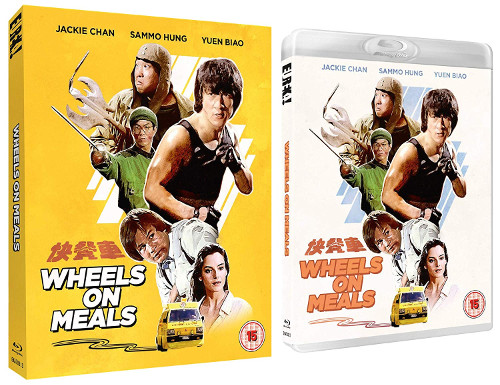
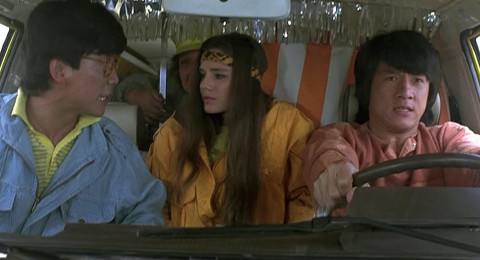
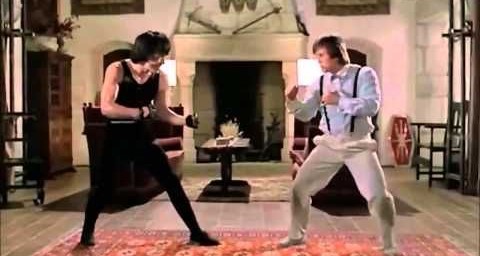



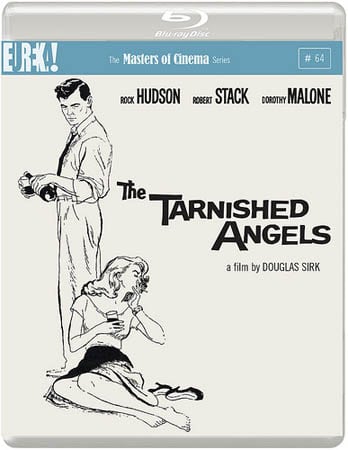
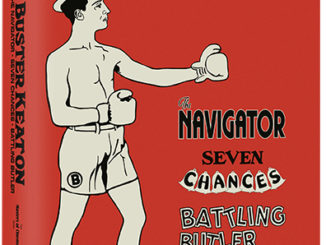
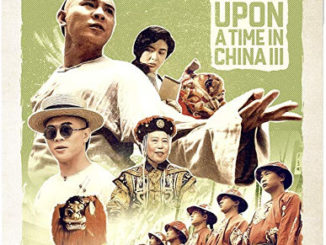
Be the first to comment